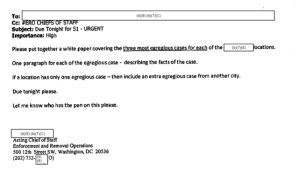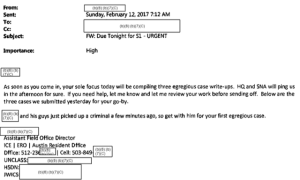Internal emails obtained through a Freedom of Information Act (FOIA) request from Texas Immigration and Customs Enforcement (ICE) officials are revealing new information about immigration raids under the current Administration.
Videos by Rare
RELATED: Texas Leaders Have Serious Thoughts on New Proposed Immigration Law.
According to the group, one email contains an order to local ICE personnel to find “three egregious cases” of criminal behavior to use as reasons to justify those raids; namely, they said the raids were conducted in the name of public safety.
The emails in question are from February of this year:

According to he Intercept findings, in February, ICE arrested around 680 people the agency claimed to be undocumented immigrants.
The report further shows, however, the problem for ICE related to how some of the persons subject to the raid possessed clean criminal records, and arresting officials said they faced trouble finding “egregious” cases, according to the emails released.
Intercept reporters conclude these claims clash with the stated mission of ICE to “…remov(e) from the streets criminal aliens and other threats to the public,” as well as “…help improve public safety,” if those being detained aren’t posing an immediate threat.
According to the FOIA findings, another internal email came from ICE’s acting chief of staff for its Enforcement and Removal Operations (ERO) division, directing staff to “put together a white paper covering the three most egregious cases” for each raid location, and, if they couldn’t come up with three, to include cases from other cities.
The subject line of that email read, “Due tonight for S1 – URGENT.” S1 is reportedly the designation given to the secretary of Homeland Security, formerly John Kelly – now Donald Trump’s White House chief of staff.
An agent in San Antonio responded to this email saying his office came up short, ultimately responding as follows:
“As soon as you come in, your sole focus today will be compiling three egregious case write-ups.”

As stories of checkpoints and detainment spread, leaders said confusion and fear were problems in their communities:
I'm concerned about the ICE raids in Texas. My statement: pic.twitter.com/SeeDSwAmyM
— Joaquin Castro (@JoaquinCastrotx) February 10, 2017
In a February statement, ICE denounced these false reports:
“Reports of ICE checkpoints and sweeps are false, dangerous and irresponsible. These reports create panic and put communities and law enforcement personnel in unnecessary danger. Any groups falsely reporting such activities are doing a disservice to those they claim to support.”
Austin City Council Member Greg Cesar said individuals’ concerns were and remain justified, however.
“They specifically went out of their way to mislead the public by searching for egregious cases,” he said in an interview with The Intercept. “And then you can see in the emails that they couldn’t find egregious cases.”
RELATED: Trump Administration’s DACA Decision Forces Congress’ Hand on Immigration
[anvplayer video=”4148317″]



